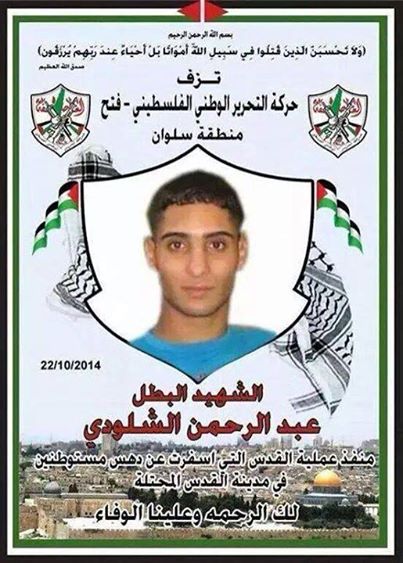A month after this attack and in line with the Government’s efforts to dissuade Palestinians to commit attacks, the Shaloudi’s house has been demolished. Indeed, in exceptional circumstances such as the one described here - namely in light of possible terrorist “waves” and their severity - the demolition of terrorist houses is ordered. This sends a powerful message to would-be terrorists and dissuades many to act.
Moreover, the demolition order can be appealed to the Supreme Court of Justice of the State. But in this case, the Shaloudi’s family decided not to exercise its rights and refused to appeal the decision.
To fully understand the context it is also crucial to know more about Abd el-Rahman and his affiliation to jihadist movements:
The perpetrator
The terrorist attack was carried out by 21-year-old Abd el-Rahman Shaloudi, a 21-year-old Palestinian from Silwan (a neighborhood in eastern Jerusalem).
Shaloudi made no secret of his support for Hamas, posting messages and video clips about the terrorist organization on his Facebook page. He is the nephew of Muhi a-Din Sharif, the former head of the terrorist organization's armed wing and its chief bomb-maker who died in 1998.
Shaloudi had been arrested for terrorism-related violence against Jews in the past and served two prison sentences. Among the charges to which he pleaded guilty were throwing petrol bombs at Jewish cars, attempted arson and aggravated assault.
Palestinian praise
 There was widespread praise of the terrorist attack by Palestinian officials, media and terrorist organization spokesmen.
There was widespread praise of the terrorist attack by Palestinian officials, media and terrorist organization spokesmen.
The Fatah movement, headed by Palestinian Authority (PA) President Mahmoud Abbas, published items glorifying Shaloudi. Sultan Abu-Aynayn, a Fatah Central Committee member and Abbas advisor, praised Shaloudi and called him "a heroic martyr" in Facebook comments posted Thursday (23 October).
On a poster published on the official Facebook Page of Fatah, we could read: “The Silwan branch of Fatah honors the heroic martyr Abdel Rahman al-Shaloudi, who executed the Jerusalem operation which led to the running over of settlers in the occupied city of Jerusalem.”
A senior Hamas spokesperson, Mushir al-Masri, praised the terrorist attack Thursday, deeming it a "daring operation" and a "natural response."
Poster on official Fatah Facebook Page
The victims
A three-month-old baby girl was thrown at least ten meters from her stroller after being struck by the car. The critically
injured infant died of her head wounds two hour later in the nearby Mount Scopus Hadassah Hospital. Eight others were injured, including the baby’s father.
The infant, Chaya Zissel Braun, was a dual Israeli-American citizen, as are her parents. The young family was returning home from her first visit to the Kotel (Western Wall). In an interview to the media, her grandfather, Shimshon Halperin, stated that Chaya's parents had tried for years to have a child and that he and his wife had flown in from the US to meet their granddaughter for the first time.

Karen Jemima Mosquera, 22, of Ecuador, critically wounded in the attack, died on Sunday, October 26. Mosquera had come to Israel a year and a half ago to complete her conversion to Judaism after discovering she was descended from Conversos, Spanish Jews who were forcibly converted to Catholicism after 1492. She spent the last two months in a Midrasha, an institute of Jewish studies for women, with other women from South America.
With such a biased article, the OHCHR discredits itself in its role of promoting Human Rights and defending victims of crimes. Instead of glorifying the family of a murderer, we would have instead expected of a UN entity to share the stories of those bereaved families who buried their 3-month old baby. But should we still be surprised by OHCHR anti-Israel practices?